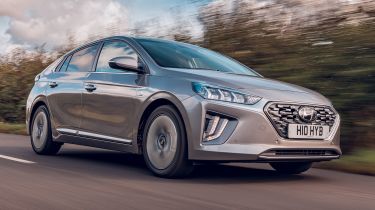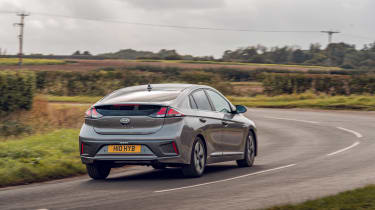Hyundai Ioniq Hybrid (2016-2022) review
The Hyundai Ioniq Hybrid is a seriously strong rival to the Toyota Prius; it's great value, easy to live with and cheap to run

Pros
- Decent practicality
- Low running costs
- Cheaper than a Prius
Cons
- Feels cheap inside
- Engine sounds coarse
- Prius has lower emissions
| Car type | Fuel economy | CO2 emissions | 0-62mph |
|---|---|---|---|
| Hybrid | 61-63mpg | 102-105g/km | 10.8s |
The Hyundai Ioniq was offered with three different powertrains – a pure-electric option, a plug-in hybrid and the full hybrid we’re reviewing here. The Hybrid served as a direct competitor to the ever-popular Toyota Prius, as well as less quirky offerings like the Toyota Corolla. The Ioniq has a similar hybrid setup to its Japanese counterparts; combined with a hatchback body, this makes it a good family car for anyone after efficient yet affordable transport. But the styling is a bit generic and forgettable.
The Ioniq Hybrid is powered by a 104bhp, 1.6-litre petrol engine, paired with a 43bhp electric motor and 1.56kWh battery. The latter is only there to assist the engine: unlike the Plug-In, the Ioniq Hybrid isn't capable of travelling on electric power for any great distance.
It’ll creep around on electric power at manoeuvring speeds, but otherwise the engine is always in play, and it’s not quiet at higher revs. Still, with claimed fuel economy of up to 63mpg and CO2 emissions from 102g/km, it promises low running costs, although it’s not exempt from the London Congestion Charge or other low-emissions zones.
Standard equipment is good, with 15-inch alloy wheels, rear parking sensors, cruise control and a leather steering wheel included on even the entry-level SE Connect model. Most buyers gravitated towards the next spec up, Premium, which added a bigger touchscreen sat-nav system and wireless phone charging, but retained the small wheels for improved efficiency.
The range-topping Premium SE got 17-inch alloys (15-inch items could be fitted as an option), rear privacy glass and leather seats (heated and ventilated up front, with the driver getting power adjustment). The interior of the Ioniq Hybrid is straightforward – solid-feeling and well designed, although it does seem a little cheap in certain areas. From the easy way it drives to the logical interior, this is a car that anyone could jump in and drive straight away.
It’ll comfortably accommodate a small family, too. There’s space to spare for front and rear-seat passengers, and the boot is a bit bigger than a Toyota Prius’. All the attributes that made the Prius such a success apply equally to the Ioniq, although as of mid-2022 both models are now available secondhand only.
The Ioniq is covered by a five-year/unlimited-mileage warranty and has a good reputation for reliability, while every model gets automatic emergency braking (which brakes the car autonomously if it detects an imminent collision) and lane-keeping assistance. For more on the Ioniq Hybrid, read on for the rest of our review...



